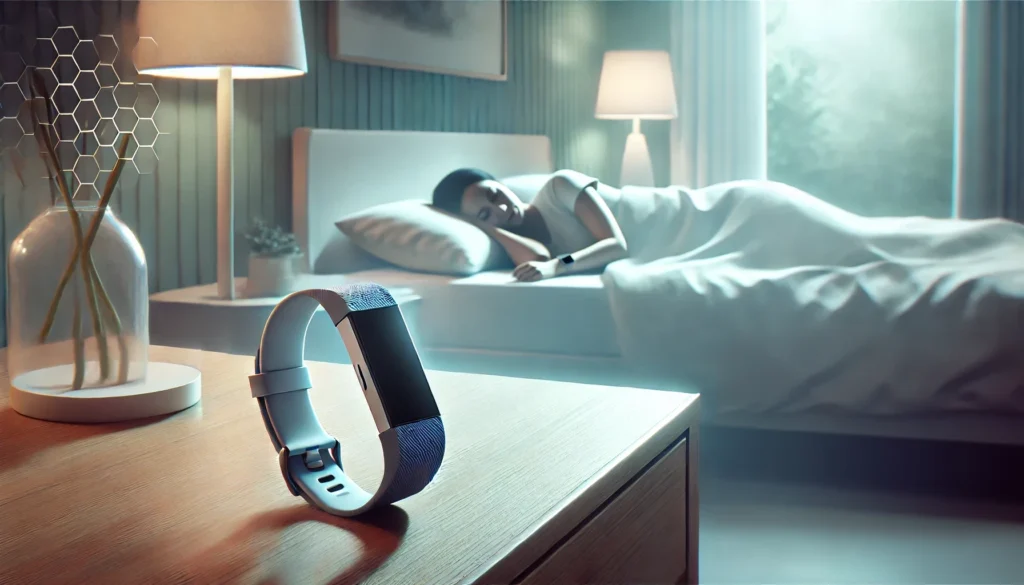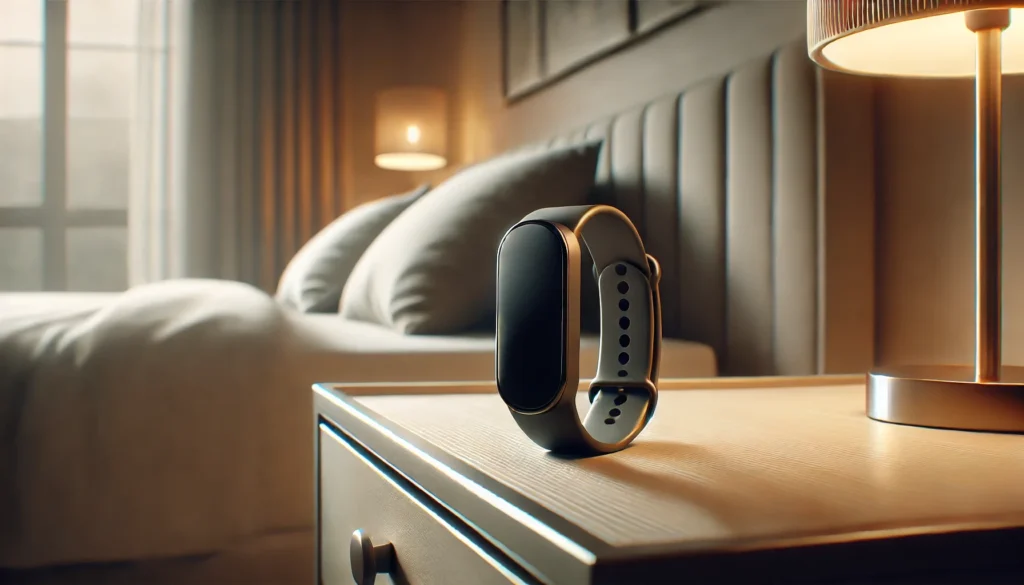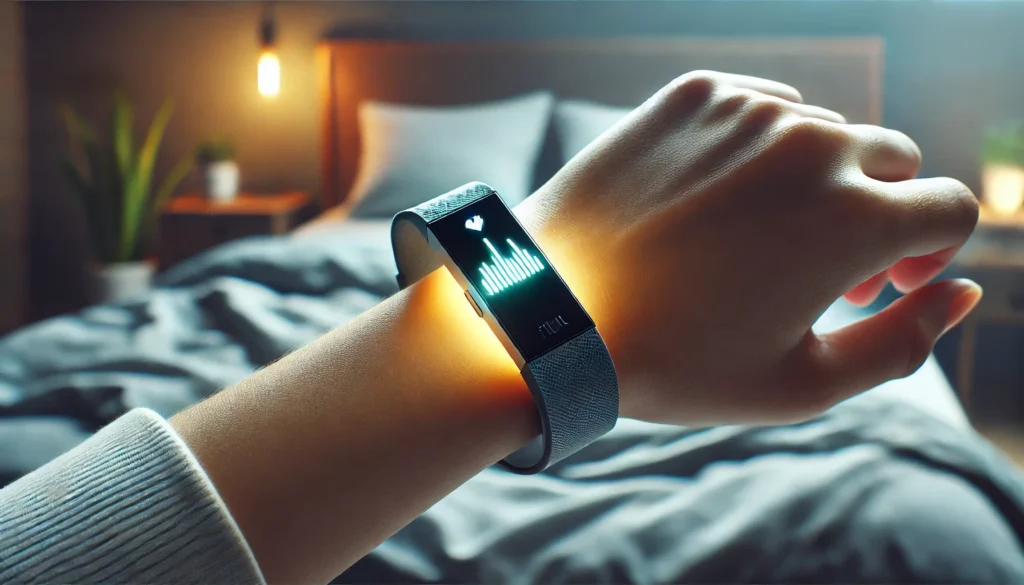Fitbit has become a household name for tracking physical activity and sleep patterns. But what makes Fitbit’s sleep tracking technology stand out? It’s the combination of advanced sensors and algorithms that monitor your movements, heart rate, and even the stages of sleep you pass through each night.
You May Also Like: Ultimate Guide to Sleep Tracker Apps
How Fitbit Tracks Your Sleep
Fitbit devices use a sophisticated blend of accelerometers, heart rate sensors, and advanced algorithms to provide insights into your sleep cycles. These sleep cycles include light sleep, deep sleep, and REM (Rapid Eye Movement) sleep. By analyzing these stages, Fitbit can give you a comprehensive view of your nightly rest.
These sensors detect subtle changes in your body’s movement and physiological signals, allowing Fitbit to accurately determine when you fall asleep and wake up. The data collected is processed to identify the quality of sleep, providing users with a detailed analysis of their sleep habits.
The integration of these technologies allows Fitbit devices to distinguish between different sleep stages, offering a level of detail that helps users understand their sleep patterns better. This data is invaluable for individuals seeking to make informed decisions about their sleep health.
The Role of Heart Rate in Sleep Analysis
Heart rate variability is a crucial metric in understanding sleep quality. Fitbit devices measure your heart rate throughout the night to detect transitions between different sleep stages. This data is then used to create a detailed sleep report, which includes your sleep score—a numerical representation of your overall sleep quality.
By monitoring your heart rate, Fitbit can identify periods of restlessness and moments when your heart rate drops, indicating deep sleep. This information is vital for assessing how well your body recovers during the night.
Heart rate data also plays a role in identifying disruptions in sleep, such as brief awakenings or periods of restlessness, which can impact overall sleep quality. Understanding these patterns can help you address potential issues and improve your sleep health.
The Accuracy of Fitbit’s Sleep Tracking
Fitbit’s sleep tracking technology is designed to offer a high level of accuracy, but like all technology, it has its limitations. The algorithms used are constantly being refined to improve precision and provide users with the most reliable data possible.
While Fitbit provides valuable insights, it’s essential to understand that no wearable device can replace a professional sleep study. However, for most users, Fitbit offers a convenient and accessible way to track sleep habits and make positive changes.
As technology evolves, Fitbit continues to enhance its sleep tracking capabilities, incorporating user feedback and scientific research to improve accuracy. This commitment ensures that users receive the most accurate and actionable sleep data available.

What Is a Typical Sleep Pattern According to Fitbit?
Now that we understand how Fitbit tracks sleep, let’s explore what a typical sleep pattern looks like according to Fitbit data.
Light Sleep
Light sleep is the initial stage where your body begins to relax and transition from wakefulness. According to Fitbit, light sleep makes up about 50-60% of your total sleep time. It’s essential for memory consolidation and physical recovery.
During light sleep, your body starts to slow down, preparing for deeper stages of sleep. This stage is crucial as it sets the foundation for the restorative processes that occur later in the sleep cycle.
Although light sleep is less restorative than deep sleep, it plays a significant role in overall sleep quality. It allows your brain to process the day’s events, aiding in memory retention and cognitive function.
Deep Sleep
Deep sleep is the restorative stage, crucial for physical recovery and growth. Fitbit data suggests that deep sleep should comprise approximately 10-20% of your sleep time. During this stage, your body repairs tissues, builds bone and muscle, and strengthens the immune system.
In deep sleep, your body’s energy is directed towards physical restoration, making it a vital component of a healthy sleep cycle. This stage is when growth hormone is released, facilitating cell repair and growth.
A lack of deep sleep can lead to feelings of fatigue and physical weakness, highlighting its importance in maintaining overall health. By ensuring you get enough deep sleep, you support your body’s natural healing processes.
REM Sleep
REM sleep, where dreaming occurs, is vital for cognitive functions such as memory, learning, and mood regulation. Fitbit indicates that REM sleep should account for around 20-25% of your sleep time.
During REM sleep, the brain is highly active, processing emotions and experiences from the day. This stage is essential for mental rejuvenation, helping to improve mood and cognitive performance.
Disruptions in REM sleep can lead to emotional instability and difficulty concentrating, emphasizing the importance of achieving adequate REM sleep each night. Understanding your REM sleep patterns can provide insights into your mental health and well-being.
Awake Periods
Throughout the night, brief awakenings are normal and can occur 10-30 times. Fitbit tracks these periods to give you a complete picture of your sleep continuity.
These awakenings are typically brief and often go unnoticed, but they play a role in the overall structure of your sleep. Monitoring these periods helps identify potential disruptions that could impact sleep quality.
Frequent or prolonged awakenings can indicate underlying sleep issues, such as sleep apnea or stress. Addressing these issues can lead to more restful and uninterrupted sleep, improving overall health.
Variability in Sleep Patterns
It’s important to note that sleep patterns can vary significantly from person to person. Factors such as age, lifestyle, and stress levels can influence how much time you spend in each sleep stage.
Understanding the variability in sleep patterns allows you to tailor your sleep habits to your individual needs. By recognizing what constitutes a “normal” sleep pattern for you, you can make informed decisions to optimize your sleep health.
What Is a Good Sleep Score on Fitbit?
Fitbit’s sleep score is a comprehensive metric that ranges from 0 to 100, with higher scores indicating better sleep quality.
Interpreting Your Sleep Score
A sleep score above 80 is generally considered good, reflecting adequate sleep duration, a healthy balance of sleep stages, and minimal interruptions. Scores between 60-79 indicate room for improvement, and below 60 suggest poor sleep quality.
Understanding your sleep score helps you evaluate your sleep health and identify areas for improvement. A higher score typically indicates a more restful and restorative sleep experience.
Your sleep score is influenced by various factors, including the duration of each sleep stage and the number of awakenings. By analyzing these components, you can gain insights into how to enhance your sleep quality.
Factors Affecting Your Sleep Score
Several factors contribute to your sleep score, including the duration of each sleep stage, your heart rate variability, and the number of awakenings. Understanding these components can help you pinpoint areas for improvement.
Lifestyle choices, such as diet and exercise, can significantly impact your sleep score. By addressing these factors, you can create a more conducive environment for restful sleep.
Stress and mental health also play a role in sleep quality. Managing stress and maintaining a positive mindset can lead to improved sleep scores and overall well-being.
The Benefits of Tracking Your Sleep Score
Tracking your sleep score over time allows you to identify patterns and trends in your sleep habits. This information can be invaluable for making informed decisions about your sleep health.
By monitoring changes in your sleep score, you can assess the effectiveness of lifestyle changes and interventions aimed at improving sleep quality. This proactive approach empowers you to take control of your sleep health.
Sharing your sleep score data with healthcare professionals can provide additional insights into your overall health, facilitating more personalized care and recommendations.

Practical Tips for Improving Your Sleep Score
Improving your sleep score isn’t just about getting more sleep—it’s about enhancing the quality of your sleep. Here are some practical tips to help you achieve better rest:
Establish a Consistent Sleep Schedule
Going to bed and waking up at the same time every day, even on weekends, helps regulate your body’s internal clock, leading to better sleep quality.
Consistency in your sleep schedule reinforces your body’s natural sleep-wake cycle, making it easier to fall asleep and wake up refreshed.
A regular sleep schedule can also reduce the likelihood of sleep disturbances, such as insomnia or difficulty falling asleep. By establishing a routine, you promote a healthier sleep environment.
Create a Relaxing Bedtime Routine
Engage in calming activities before bed, such as reading, meditating, or taking a warm bath. This can signal your body that it’s time to wind down.
A relaxing bedtime routine helps reduce stress and anxiety, creating a peaceful transition from wakefulness to sleep. This practice can enhance sleep onset and quality.
Incorporating mindfulness or relaxation techniques into your routine can improve sleep by calming the mind and promoting relaxation. Finding activities that work for you is key to establishing a successful bedtime routine.
Optimize Your Sleep Environment
Ensure your bedroom is conducive to sleep by keeping it dark, quiet, and cool. Consider using blackout curtains, earplugs, or a white noise machine if necessary.
A comfortable sleep environment minimizes distractions and promotes restful sleep. Adjusting factors such as temperature and noise levels can significantly impact sleep quality.
Investing in a comfortable mattress and pillows can also enhance your sleep environment, providing the necessary support for a good night’s rest. Personalizing your sleep space to meet your preferences is essential for optimal sleep.
Limit Exposure to Screens
The blue light emitted by phones, tablets, and computers can interfere with the production of melatonin, the sleep hormone. Try to avoid screens at least an hour before bedtime.
Reducing screen time before bed helps your body prepare for sleep by allowing melatonin levels to rise naturally. This practice can improve sleep onset and quality.
Consider using blue light filters on electronic devices or engaging in screen-free activities in the evening. These changes can support a healthier sleep routine and improve overall sleep health.
Monitor Your Diet and Exercise
Consuming caffeine or heavy meals close to bedtime can disrupt sleep. Regular physical activity, on the other hand, can promote better sleep, especially when done earlier in the day.
Being mindful of your diet and exercise habits can have a profound impact on sleep quality. Opting for light meals and avoiding stimulants in the evening can lead to more restful sleep.
Incorporating regular exercise into your routine can improve sleep by reducing stress and promoting physical tiredness. Finding the right balance between diet and exercise is crucial for enhancing sleep health.
Future Implications of Sleep Tracking Technology
As technology continues to evolve, the potential for even more personalized sleep insights grows. Future developments may include integrating sleep data with other health metrics to provide a holistic view of wellness. This could lead to more tailored recommendations for improving sleep and overall health.
Advances in Sleep Tracking Technology
Ongoing advancements in wearable technology promise more accurate and detailed sleep tracking capabilities. These innovations may include improved sensors and algorithms that offer deeper insights into sleep patterns.
Future devices may integrate additional health metrics, such as stress levels or respiratory patterns, to provide a comprehensive view of overall wellness. This holistic approach could revolutionize how we understand and manage sleep health.
As technology becomes more sophisticated, the potential for personalized sleep insights will expand, empowering users to take proactive steps towards improving their sleep and overall well-being.
The Role of Artificial Intelligence in Sleep Analysis
Artificial intelligence (AI) is poised to play a significant role in the future of sleep tracking technology. AI algorithms can analyze vast amounts of sleep data to identify patterns and trends that may not be apparent to the human eye.
By leveraging AI, future devices could offer personalized sleep recommendations based on individual sleep patterns and lifestyle factors. This personalized approach could lead to more effective interventions and improved sleep health outcomes.
The integration of AI in sleep tracking technology could also facilitate early detection of sleep disorders, enabling timely intervention and treatment.
The Impact of Sleep Tracking on Healthcare
Sleep tracking technology has the potential to transform healthcare by providing valuable data that can inform clinical decisions and treatment plans. By integrating sleep data with other health metrics, healthcare professionals can gain a more comprehensive understanding of a patient’s overall health.
This integration could lead to more personalized care and tailored recommendations for improving sleep and overall well-being. As sleep tracking technology continues to evolve, its impact on healthcare is likely to grow, offering new opportunities for enhancing patient outcomes.

Conclusion
Understanding your sleep patterns with the help of Fitbit can be a game-changer for your health and well-being. By analyzing typical sleep patterns, interpreting sleep scores, and implementing practical strategies, you can significantly enhance your sleep quality. As we continue to unravel the complexities of sleep science, tools like Fitbit pave the way for a deeper understanding and better health outcomes. Whether you’re a health coach, journalist, or biohacker, these insights can empower you to optimize your sleep and, ultimately, your life.
Embracing a Sleep-First Approach to Wellness
Prioritizing sleep as a fundamental component of overall wellness can lead to significant improvements in health and quality of life. By embracing a sleep-first approach, you can unlock the benefits of restorative sleep and enhance your well-being.
Harnessing the Power of Technology for Better Sleep
Leveraging wearable technology, such as Fitbit, allows you to gain valuable insights into your sleep patterns and make informed decisions to improve your sleep health. This data-driven approach empowers you to take control of your sleep and, ultimately, your life.
Looking Towards the Future of Sleep Health
As sleep tracking technology continues to evolve, the future holds exciting possibilities for enhancing sleep health and overall well-being. By staying informed and embracing these advancements, you can optimize your sleep and enjoy a healthier, more fulfilling life.
Further Reading:
Fitbit Sleep Patterns: Understanding Normal Sleep Patterns
How to Track Your Sleep Using Your Fitbit
What is Fitbit Sleep Mode: A Complete Guide to Tracking your Sleep
Important Note: The information contained in this article is for general informational purposes only, and should not be construed as health or medical advice, nor is it intended to diagnose, prevent, treat, or cure any disease or health condition. Before embarking on any diet, fitness regimen, or program of nutritional supplementation, it is advisable to consult your healthcare professional in order to determine its safety and probable efficacy in terms of your individual state of health.
Regarding Nutritional Supplements Or Other Non-Prescription Health Products: If any nutritional supplements or other non-prescription health products are mentioned in the foregoing article, any claims or statements made about them have not been evaluated by the U.S. Food and Drug Administration, and such nutritional supplements or other health products are not intended to diagnose, treat, cure, or prevent any disease.


